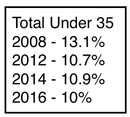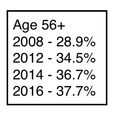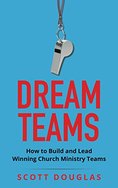|
Back in 2013 I defended and finished my doctoral thesis, where I looked at the leadership development of Millennial ministry staff members as they were discipled by their lead pastor. It was as thrilling as you might expect. And at the end of it all, I wrote a Seinfeld episode "It was a dissertation about nothing!" Unfortunately because of my methodology, I was only able to use a small number of churches, which led to insignificant conclusions. It's available online as a PDF if you need help sleeping at night. One of the best tools I discovered during the process was the Compensation Study put together jointly by LifeWay and Guidestone, giving one of the most comprehensive snapshots of ministry demographics in the Southern Baptist Convention. It will give you a breakdown by education, church size, state, full-time or part-time, by staff position, and age. Churches can use it to determine compensation packages based on similar situations, and researchers can get a glimpse at the overall profile of SBC ministry leaders. In 2016, 4,558 pastors alone participated. Needless to say, it's an incredible wealth of data. Below you'll see a table that breaks down the ages of full & part-time pastors for 2008, 2012, 2014, and 2016. I wish I could include 2010, but I haven't been able to get that raw data. If you've got it, I'd love it!  Right off the bat, we have to acknowledge this isn't a perfect sampling. It is only of those who actively participated in the study. But because there's so many, it's a good picture of SBC pastors. The point of this essay is to highlight some trends that I observed, and some connection to my doctoral thesis, which bears implication today on raising up leaders on your church staff. The first thing that's easy to observe from this is that overwhelmingly, churches are continuing to give lead pastor positions to older men. There's nothing wrong with that. I'm more prepared at 34 to be a pastor than I was at 24. Even at 30. By valuing the position of pastor and reserving it for those who have proven themselves, it's natural that it's typically filled by men with some life experience behind them. But one thing I noticed along with that is that lead pastor positions aren't getting any younger. Check out this table, which I compiled the decline in percentage of younger pastors. If anything, lead pastor positions are being filled by an increase of older men. This isn't a negative, just an observation.  But along with that comes the observation that the percentage of older pastors in SBC churches has in fact increased since 2008. One of the key foundations for my dissertation was that as the Baby Boomer generation moved into retirement, there would be a need to look to Millennials to fill those roles, since the generation between them (Gen-X) was a much lower population base. It's hard to prove this, but my inference is that pastors are staying in ministry longer and not retiring as quickly, and there are ample numbers of older Gen-X who are able to move into these lead pastor roles. Because the oldest Millennials are only now entering their mid 30's, it's not a far conclusion to suggest that older colleagues are still preferred for lead pastor positions. So what does all this mean? It means simply that the importance of intergenerational discipleship is still there, especially with younger men on the ministry staff. Another project I did for a paper I presented at SPCE in 2014 dealt with career expectations among SBC staff members. The gist of that work was that while many staff members are content with their roles and don't have a desire for a lead pastor position, many do. And they are in a unique position with their relationship with their lead pastor to be discipled towards that lead pastor role. The wisdom, experience, and tenure of the current lead pastor is invaluable to the staff member who desires to one day become a lead pastor. Intergenerational discipleship is relational, informal, and intentional. It's relational in the sense that the lead pastor needs to know their staff, and vice versa. Effective ministry happens through the deepening of relationships. And sadly one of the inferences I made from my thesis was that "these guys spend 40 hours a week working together and it looks like they don't know each other!" So older pastor, take time to invest in younger guys on your staff. Invest especially in those who have a desire to one day occupy a lead pastor role. Give them more than your leftovers. Give them your time, give them your platform on occasion, and give them opportunity. Listen to them. I'll never forget the heartache of being told I didn't have an opinion because "I didn't have the experience" from my pastor. Lead pastors, listen to those guys on your staff, and develop a relationship with them. Don't be intimidated by them. They don't want your job. They want to learn from you. They're loyal to you. And they've taken hits for you. Give them the same in return. It's also informal. Discipleship doesn't happen in a course, curriculum, or program. And even when you work through a reading list (which you should), or develop case studies (which you should), or work on objective-based learning (which you should), the meat of discipleship happens informally. It happens during conversation. It happens more when it's caught than when it's taught. When Jesus talked about this, He said the student wasn't complete until he was like his teacher. That's more than graduation, that's imitation. Intergenerational discipleship means you're letting your life, experiences, and mistakes serve as a transparent lesson for the reality of ministry. Finally, it's intentional. No discipleship, no growth, no development, happens by itself. In fact, the #1 answer I've gotten over several surveys of staff members on what their lead pastors were doing to help develop them as leaders was "Nothing." If you want to develop yourself as a leader, you've got to take initiative and be intentional about it. You've got to ask questions, make yourself available, make every effort to secure your leader's time, and learn as much as you can. Likewise, lead pastors need to be proactive in their scheduling so that their time is well-spent, and they are able to devote the time necessary to those on their staff with a desire for a lead pastor role. The reality is those churches are typically 400-500 people, and pastors live in the tension of shepherding a small church while managing a large church. Confused? Me too. But that's why it's so important to be intentional. If you're not, you'll find yourself on Friday saying "maybe next week?"  Thanks for letting me nerd out on this! If you get a chance, check out the book I wrote on developing a ministry team. It's full of practical information and steps for your church to have not just a staff, but a healthy and effective team.
6 Comments
8/22/2017 05:33:37 pm
World make many progress in the field of media and education make us able to adopt the different up to date ways to make us inform about the latest changes in the field of media and aware about the developments around the world.
Reply
11/14/2017 08:52:41 am
I am looking for the sites which give the best offer and have the good material of the essay. This site is looking better among the other sites because of the good material. So, I am going to buy some important essay from this site.
Reply
Leave a Reply. |
Scott M. DouglasA blog about leadership and the lasting legacy of family ministry. Archives
August 2023
Categories
All
|

 RSS Feed
RSS Feed



